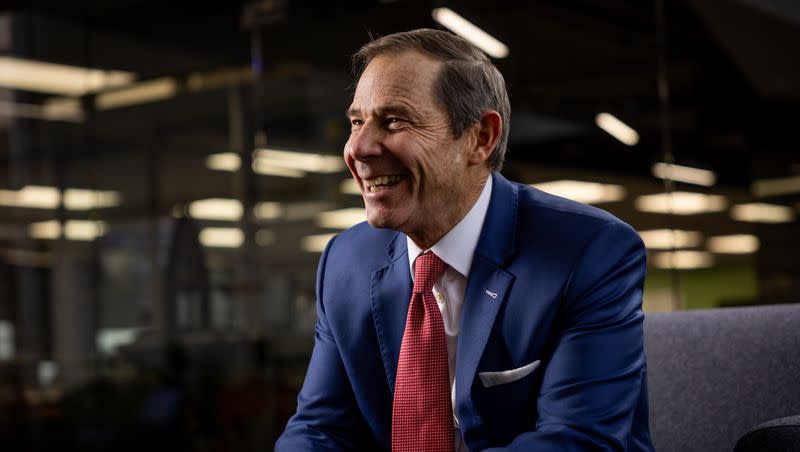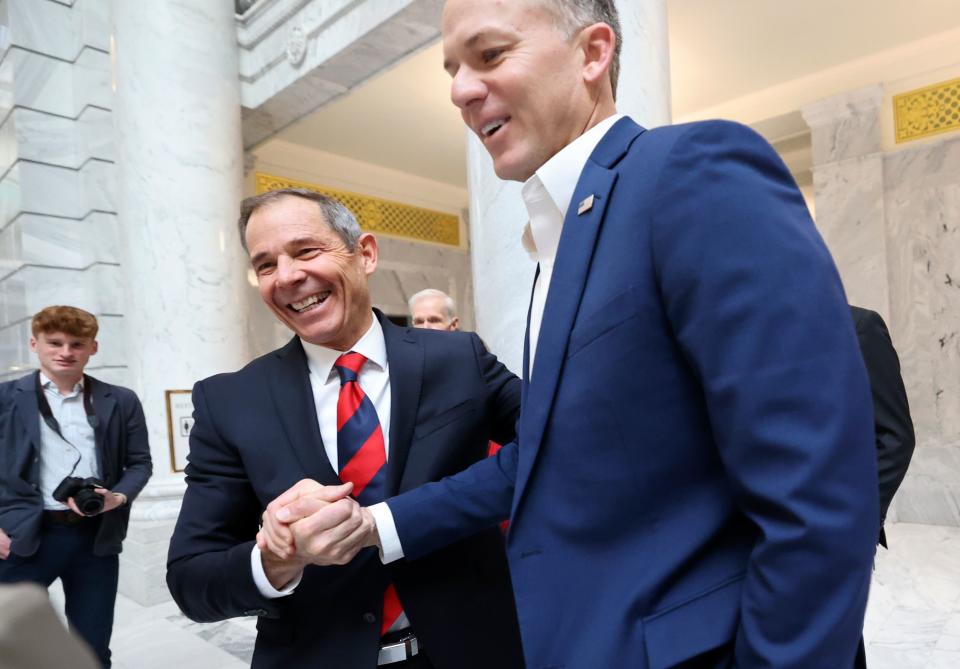Rep. John Curtis is running to replace Mitt Romney in the Senate

- Oops!Something went wrong.Please try again later.
Rep. John Curtis made his much-rumored intentions to fill Mitt Romney’s Senate seat official Wednesday morning, filing his declaration of candidacy at the Utah lieutenant governor’s office.
Curtis, who was elected to represent Utah’s 3rd Congressional District in 2017, joins former Utah House Speaker Brad Wilson, Riverton Mayor Trent Staggs and the son of late Sen. Orrin Hatch, Brent Hatch — who each filed for candidacy Tuesday — as well as several other 2024 hopefuls, in what is gearing up to be a hotly contested Republican primary to replace Romney.
Curtis’ decision to swap reelection to the U.S. House of Representatives for senatorial ambitions comes after he published an October op-ed in the Deseret News in which he turned down a Senate campaign. Curtis reopened the door, however, after those closest to him, as well as a chorus of constituents and donors, asked him to reconsider.
“The voices just kept growing in numbers and in volume. And to be honest one of those voices was my wife and my children,” Curtis said Thursday in an interview with the Deseret News, in anticipation of his planned announcement. “So I eventually started to ask myself the question ‘Did I rush into that decision?’”
Under the perception he had to make a decision quickly following Romney’s surprise retirement announcement, Curtis said his initial hesitancy about a Senate run was caused by a desire to fulfill commitments to his district, maintain his momentum as one of the most effective lawmakers in the House and continue to prioritize his relationship with his family, which includes six children and 17 grandchildren. But after some introspection, the congressman said he realized those priorities could be better met in Romney’s shoes.
“I started thinking about things like ‘If I really cared about serving my district, could I actually be a better voice for them in the Senate than I am in the House?’ And the answer to that is clearly yes,” Curtis said.
Related
Despite some head-scratching in Utah political circles about his back-and-forth, Curtis feels his initial reaction to the open Senate seat was a good sign “because it shows that I was not aspiring for this.” It was conversations with his most trusted family and friends, not opportunism, Curtis said, that led him to believe a Senate campaign was the best path to a “much louder and broader platform to bring a unifying voice” to the issues that matter most to Utahns, particularly energy policy, public land management and U.S.-China relations.
When asked whether his decision to reconsider — which coincided with an $89,000 ad purchase by the mysterious Conservative Values for Utah PAC — had something to do with promised funding from special interests or Romney donors, Curtis said there will always be those who offer to help with a campaign but that hasn’t removed the uncertainty that comes along with putting your name at the top of the ballot.
“I’ve never been approached in any campaign by somebody who took that worry away from me,” Curtis said. “So I would say that stress has not been relieved from me even at this moment right now. And it was more a decision of, ‘Is this the right thing for me to do?’”
One factor that may have made it easier to seek a position in Congress’ upper chamber, Curtis said, was the incessant gridlock and showmanship he encountered in the House. He hopes the Senate will be an environment where more serious legislating can take place.
Curtis’ legislative priorities include areas where he feels like he has the greatest experience. The congressman currently serves on the House Communications & Technology Subcommittee, the Federal Lands Subcommittee, and previously served on the House Foreign Affairs Committee. He said his policy goals would revolve around regulating artificial intelligence, expanding local control over public lands and deterring China from further encroaching on Hong Kong and Taiwan, where he lived for three years as a young man.
I just left the Lt Governor's office where I filed to run for U.S. Senate! 🇺🇸 I’ll keep working hard to get things done for Utah & make our state an even better place. Together, we can ensure America has a bright future. Join me by donating/volunteering at https://t.co/U6Yw5H2k4H pic.twitter.com/1x9rSQndqx
— John Curtis (@CurtisUT) January 3, 2024
But Curtis’ main focus in the Senate will be, as it has been in the House, spearheading a conservative approach to climate policy that incorporates fossil fuels and nuclear energy into an affordable, reliable and clean energy transition.
“I feel like I have developed an expertise that, to be honest, is unmatched in the House, and that, in many ways, I’m the go-to person on energy and climate policy for the Republicans,” Curtis said. “That clearly is something that I will want to continue working on.”
As part of his evaluation on whether to leave the House, Curtis said he had to make sure the Conservative Climate Caucus he founded in 2021, which now tallies 81 Republican members, was in good hands. He has asked six members to be co-chairs and one to serve as chair.
Curtis knows better than most how discussions of climate change and energy transitions can be met with skepticism from some conservatives. But Curtis said the more his constituents learn about what he’s doing, the more they agree with him.
“As they understand that I’m offering solutions for conservatives that don’t ask them to give up their conservative values, I find great support,” Curtis said.
Curtis hopes the same can be said of his efforts to expand his name recognition beyond his district — which includes the Wasatch Front from Provo to Sandy and nearly all of eastern Utah — to the rest of the state. In Utah County, where he served as mayor of Provo from 2010 to 2017, and throughout his district, Curtis said his political lane “is carved in stone,” meaning voters are aware of his commitment to civility and finding friends across the aisle, as well as his conservative bona fides.
But while he may share some characteristics with the senator he hopes to replace, and Sen. Mike Lee, who Curtis says he knows well, voters should expect a very unique brand of conservatism from the state’s freshest Senate candidate.
“If people are expecting me to be Mitt Romney, I’ll disappoint them. And if they’re expected me to be Mike Lee I’ll disappoint them,” he said. “I’m John Curtis.”
Related

Curtis’ experience on Capitol Hill, particularly his knowledge of the legislative process, will also set him apart, he said. The congressman has passed 19 bills into law during his tenure in Congress, including the Emery County Public Land Management Act, which established the San Rafael Swell Recreation Area and Jurassic National Monument, expanded Goblin Valley State Park and secured 100,000 acres of school trust land in Utah.
If he is elected to the Senate, Curtis explained, “it won’t be like Utah starting over in that seat,” because his seniority will carry over from the House, giving him a boost in a committee assignments, among other things.
As he did in his previous four elections, Curtis will gather signatures to ensure his appearance on the Republican primary ballot in addition to taking the state’s convention path “very seriously.” Curtis called the 28,000 signature requirement “overwhelming” and acknowledged a statewide campaign will require more of his time than a House reelection bid.
Despite a possible advantage in name recognition, Curtis said the Republican primary will be a hotly contested race. Wilson, who scored the endorsement of Utah Gov. Spencer Cox, has already amassed more than $3 million and has a nearly eight month head start on Curtis since he began openly pursuing a Senate campaign.
But Curtis said competition at the polls will produce a better outcome for the state.
“To the extent that makes people pause and think about who they’re going to support of two people they’ve known that’s healthy,” Curtis said. “That puts pressure on us as candidates to to make a case for why it should be us. And I look forward to that.”

